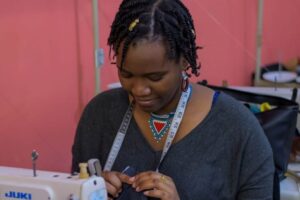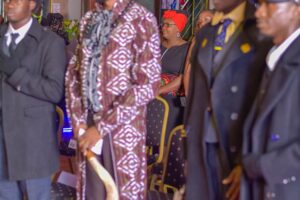Fashion Courses That Prepare You for the Industry
Introduction
The fashion industry is more than glitz, glamour, and runway lights—it is a global business worth billions, powered by creative professionals with practical skills and industry knowledge. Whether you aspire to become a fashion designer, tailor, stylist, or fashion entrepreneur, taking the right fashion courses is key to building a successful career.
With the rise of TVET (Technical and Vocational Education and Training) institutions across Africa, students now have access to fashion-related programs that blend hands-on training with industry insight. In this article, we explore essential fashion courses that truly prepare you for the real world—whether you’re entering the workforce, launching a brand, or freelancing as a creative.
Why Choose Industry-Focused Fashion Courses?
Fashion is a competitive field. Employers, clients, and consumers expect professionals who can deliver both quality and creativity. The right course will equip you with:
- Practical skills (cutting, sewing, sketching)
- Design thinking and creativity
- Understanding of trends and markets
- Entrepreneurship and business knowledge
- Professional standards and ethics
A good fashion course doesn’t just teach you how to create—it teaches you why, for whom, and how to sell it.
Top Fashion Courses That Prepare You for the Industry
Here’s a breakdown of the most relevant and career-ready fashion courses offered by vocational training centers, fashion colleges, and TVET institutions:
- Garment Making (Tailoring and Dressmaking)
Overview:
This is one of the most practical and in-demand fashion courses. It teaches how to make garments from start to finish—cutting, fitting, sewing, and finishing.
Key Topics:
- Body measurements and fitting
- Fabric types and handling
- Machine operation and maintenance
- Skirt, blouse, dress, shirt, and trouser construction
Career Opportunities:
- Tailor
- Dressmaker
- Uniform or custom clothing producer
- Home-based clothing business
Best For: Beginners and anyone who wants to enter the fashion industry with strong technical skills.
- Fashion Design and Illustration
Overview:
This course focuses on the creative and visual side of fashion. Students learn how to create original design concepts and present them through sketching or computer-aided design (CAD).
Key Topics:
- Fashion sketching and illustration
- Design elements and principles
- Color theory and mood boards
- Storyboarding and fashion trends
Career Opportunities:
- Fashion designer
- Illustrator
- Product developer
- Fashion merchandiser
Best For: Creative thinkers and artists who want to bring ideas to life on paper or screen.
- Pattern Drafting and Cutting Technology
Overview:
Pattern making is the engineering side of fashion. It converts design ideas into precise templates used in garment production.
Key Topics:
- Flat pattern drafting
- Draping techniques
- Grading and sizing
- Pattern alteration and adjustment
Career Opportunities:
- Pattern maker
- Sample maker
- Technical designer
- Fashion production assistant
Best For: Those with technical aptitude and attention to detail.
- Textile and Fabric Studies
Overview:
Understanding textiles is essential for anyone working in fashion. This course teaches about fibers, fabrics, their properties, and how they behave when cut, sewn, or worn.
Key Topics:
- Natural and synthetic fibers
- Fabric construction (weaving, knitting)
- Fabric finishing and treatment
- Dyeing, printing, and batik
Career Opportunities:
- Fabric buyer
- Textile specialist
- Surface designer
- Garment quality inspector
Best For: Students interested in materials and how they affect design and functionality.
- Fashion Business and Entrepreneurship
Overview:
This course prepares students to run a fashion business or manage a fashion-related enterprise.
Key Topics:
- Business planning and costing
- Branding and marketing
- Customer service and communication
- Financial management
Career Opportunities:
- Fashion brand owner
- Boutique operator
- Online clothing retailer
- Freelance fashion entrepreneur
Best For: Aspiring business owners and freelancers.
- Fashion Styling and Image Consultancy
Overview:
This creative course teaches students how to style individuals, celebrities, or models for photo shoots, events, or personal branding.
Key Topics:
- Personal and commercial styling
- Color coordination
- Fashion history and trends
- Wardrobe planning
Career Opportunities:
- Fashion stylist
- Personal shopper
- Image consultant
- Event wardrobe planner
Best For: People with a good eye for fashion and a flair for trendspotting.
- Industrial Machine Operation and Maintenance
Overview:
A hands-on course focusing on the use of industrial sewing machines used in factories and production units.
Key Topics:
- Machine threading and troubleshooting
- Use of overlock, straight stitch, and coverstitch machines
- Fabric handling in mass production
- Workplace safety
Career Opportunities:
- Industrial tailor
- Machine operator
- Factory line supervisor
- Production technician
Best For: Those aiming to work in large-scale fashion manufacturing.
- Computer-Aided Fashion Design (CAD)
Overview:
With technology transforming fashion, this digital course teaches how to use design software for pattern making, sketching, and virtual prototyping.
Key Topics:
- Adobe Illustrator for fashion
- CLO3D or Optitex design software
- Digital fabric simulation
- Tech pack development
Career Opportunities:
- CAD designer
- Fashion technologist
- Design assistant (digital)
- Online fashion brand developer
Best For: Tech-savvy students or anyone planning to work with global brands or e-commerce.
Bonus Short Courses (Add-on Skills)
Many institutions also offer short-term courses to enhance core learning:
- Embroidery and Beading
- Fashion Photography and Editing
- Digital Marketing for Fashion
- Sustainable Fashion Practices
- Leatherwork and Accessories Making
These courses help students specialize and stand out in a crowded market.
Where to Study These Courses (Kenya & Africa)
- Delight Fashion School – Kenya
- Buruburu Institute of Fine Arts – Nairobi
- Sew Africa Fashion College – Nairobi
- Lagos Fashion Institute – Nigeria
- Fashion Design Institute (FDI) – Mauritius
- TVET and Youth Polytechnics in Kenya and Uganda
Most of these offer NITA-certified or nationally accredited courses.
Choosing the Right Course for You
When selecting a course, ask yourself:
✅ Do I want to design, make, or market fashion?
✅ Am I more creative or technical?
✅ Do I want to work alone or in a team?
✅ What’s my budget and how long can I commit?
✅ Do I prefer working with clients, factories, or in digital spaces?
Your answers will guide your course selection and future path.
Conclusion
Fashion is no longer just about trends—it’s a skilled profession that demands knowledge, creativity, and business sense. Whether you’re dreaming of launching your brand or joining the global industry, the right course is your first step. TVET and vocational institutions across Africa now offer modern, relevant fashion training that can take you from student to industry-ready in under two years.
The fashion world is waiting—get skilled, get certified, and get started.



